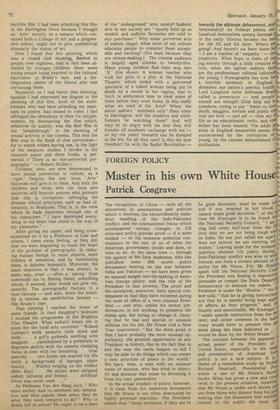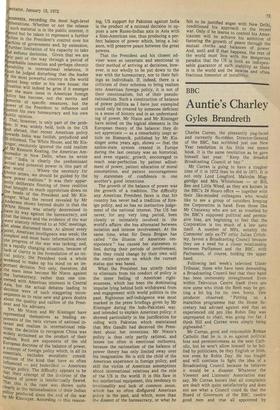FOREIGN POLICY
Master in his own White House
Patrick Cosgrave
The recognition of China — with all the alterations in assumptions and policies which it involves, the extraordinarily maladroit handling of the Indo-Pakistani conflict, and the international fracas which accompanied certain changes in US economic policy provide proof — if it were needed — of the immense potential consequence to the rest of us of what the American government thinks and does, or tries to do. At the same time — through the agency of Mr Jack Anderson, who has published some 200 secret policy documents bearing on the war between India and Pakistan — we have been given an unusual insight into the making of American foreign policy, and the role of the President in that process. The proof and the revelation, moreover, have special consequence in that they have occurred during the term of office of a very unusual President — one who, unlike his recent predecessors, is not working to preserve the status quo, but trying to change it. Denying that he had any special or unusual abilities for his job, Mr Nixon told a New Year interviewer, "But the main point is that I have probably the most unusual opportunity, the greatest opportunity of any President in history, due to the fact that in just the way the cards happen to fall I may be able to do things which can create a new structure of peace in the world." We have, then, a man with an unusual sense of mission, who has tried to objectify and distance that sense by divorcing it from his own personality.
In the actual conduct of policy, however, it is clear from the Anderson documents that Mr Nixon is too often dominated by highly personal reactions. The President claims that " Great decisions, if they are to be good decisions, must be made cool and if you respond in hot blood, cannot make good decisions "; at the s!: time Mr Kissinger is to be found tel" the National Security Council, "I arn ting hell every half-hour from the Pr" dent that we are not being tough enl on India. He has just called me again: does not believe we are carrying out wishes." Leaving aside for the momentl question whether US policy during Indo-Pakistani conflict was wise or well formed, one feels a certain amount of s) pathy for Mr Nixon. For, Mr Kis5ifi! again told the National Security couill the President was finding it impossible persuade or compel the State Departrilwe bureaucracy to execute his orders. President is under the 'illusion '," the IN" wer told, "that he is giving instructions' not that he is merely being kept apPti! of affairs as they progress," and, 111'• bluntly and emotionally, Mr Kissinger "under specific instruction from the Pr6, dent, and either someone in the buret cracy would have to prepare this 0 ment along the lines indicated or would be done by the White House." The contrast between the apparent 1116 actual power of the President of United States, especially in the shaP,1, and presentation of American for policy, is not a new subject. It is theme of a remarkable study by Prof& Richard Neustadt, Presidential which is one of Mr Nixon's favo°11 books. What has given a new and virnle twist to the present situation, however:, that Mr Nixon is under such severe prr",c ure from those who dissent from his poi; making that the dissenters feel entitle° release to the public the most sed ?cuments, recording the most high-level I".liberations. Whether or not the release C ),* such material is in the public interest, it Yvinnot but be taken to represent a further It/ecline in the President's control over his e tachine of government and, by extension, 40 further limitation of his capacity to take Ond enforce decisions. Given that we are fnly part of the way through a period of °emarkable innovation and perhaps chronic Astability in international relations, it e5ust be judged disturbing that the leader If the most powerful country in the world 'annot keep order in his own house: the , lituation will indeed be grim if it emerges hat the main issue in American foreign olicy has become, not the merits and ) emerits of specific measures, but the a,)ower of the President to influence and P..11:ontrol his own bureaucracy and his own Paublic opinion. tiv' That, however, is only part of the probelem. It was widely held, both in the US And abroad, that recent American policy iowards India was foolish, prejudiced and f .11-informed. The White House, and Mr Kissinger, resolutely ignored the cold realism of Mr Kenneth Keating, the American Ambassador in New Delhi, when he wrote that "India is clearly the predominant actual and potential power in this part of iithe world . . . Where the necessity for choice arises, we should be guided by the ignew power realities." It was their apparently deliberate flouting of these realities that brought so much opprobrium down on the heads of the President and Mr Kissinger. What the record revealed by Mr ,01Anderson shows beyond doubt is that the y White House was utterly determined to 01 have its way against the bureaucracy, and al that the issues and the evidence of the war g were scarcely referred to at NSC meetings, re let alone discussed there. At almost every Ai point, American intelligence was weak; the . I simplest and most basic information about I the progress of the war was lacking; and, t1 in a rapidly changing situation, because. of I lack of clarity in the formulation of an ini11 tial Polley, the President took a whole ;Yi weekend to make up his mind on an imr11 Portant decision. Not only, therefore, did II, the main issue become Mr Nixon against ,3 the bureaucracy, rather than one con19 cerned with American interests in Central Asia, but the actual debates leading to 1, decision were of such staggering inconr sequence as to raise new and grave doubts 9 about the quality and calibre of the Presi dent and his advisers. f Yet, Mr Nixon and Mr Kissinger have f represented themselves as leading exponents of the twin virtues of national in I terest and realism in international relations: the decision to recognise China was / widely acclaimed as the product of their realism. Both are exponents of the old European doctrine of the balance of power, a concept of foreign policy which, in all its essentials, excludes moralistic considerations of the kind that have so often influenced — and bedevilled — American foreign policy. The difficulty appears to be that their concept of the doctrine of the balance of power is intellectually flawed. That this is the case was shown quite Clearly in the rationalisation of their Indian Policy produced since the end of the war by Mr Kissinger. According to this reason ing, US support for Pakistan against India is the product of a rational decision to oppose a new Russo-Indian axis in Asia with a Sino-American one, thus producing a perfect balance of power which, being a balance, will preserve peace between the great powers. That the President and his closest adviser were so uncertain and emotional in their method of arriving at decisions, however, is not wholly to be put down to the war with the bureaucracy, nor to their failings as individuals. If, indeed, there is a criticism of their schemes to bring realism into American foreign policy, it is not of their emotionalism, but of their pseudorationalism. Such a construction of balance of power politics as I have just exampled could only be created by someone deficient in a sense of history and in an understanding of power. Mr Nixon and Mr Kissinger have seized on the logical elements in the European theory of the balance: they do not appreciate — as a remarkably inept article on Bismarck, published by Mr Kissinger some years ago, shows — that the nation-state system created in Europe during the last century was an historical, and even organic, growth, encouraged to reach near-perfection by patient adjustment of power, patient education of moral assumptions, and patient encouragement by statesmen of confidence in one another's good intentions. The growth of the balance of power was the growth of a tradition. The difficulty any American President faces is that his country has never had a tradition of foreign policy, and so has no instinctive judgement of the national interest. The US has never, for any very long period, been closely or intimately involved in the world's affairs: she has alternated between isolation and intense involvement. At the same time, what Sir Denis Brogan has called "the illusion of American omnipotence" has caused her statesmen to feel, during their periods of involvement, that they could change by their own will the entire system on which the current status quo was based. What the President has utterly failed to eliminate from his conduct of policy is the inner feeling of American righteousness, which has been the dominating impulse lying behind both withdrawal from and engagement with world politics in the past. Righteous self-indulgence was most marked in the press briefings given by Mr Kissinger during the Indo-Pakistani war, and intended to explain American policy: it showed particularly in the justification for siding with Pakistan which maintained that Mrs Gandhi had deceived the President about her intentions. Mr Nixon's policy is thus only partly rational, and issues too often in emotional outbursts, because the rationalism of the balance of power theory has only limited sway over his imagination. He is still the child of the American experience in foreign policy, and still the victim of American assumptions about international relations and the role of the US in the world. It is this flaw in his intellectual equipment, this tendency to irrationality and lack of common sense, which has so often disfigured American policy in the past, and which, more than the dissent of the bureaucracy, or what he felt to be justified anger with New Delhi, conditioned his approach to the recent war. Only if he learns to control his Americanism will he achieve his ambition of fostering the growth of peace through the mutual checks and balances of power. And, until and if that happens, the rest of the world must live with the dangerous paradox that the US is both an indispensable guarantor of such stability as there is in the world and the unwise and often fractious fomentor of instability.











































 Previous page
Previous page